

SUNDAY, JANUARY 19, 2025



SUNDAY, JANUARY 19, 2025
PIONEERING CHANGE IN THE HEALTH SECTOR



r. Adaeze Oreh is an accomplished public health expert and transformative leader, currently serving as the Honourable Commissioner for Health in Rivers State, Nigeria. With a distinguished career dedicated to advancing healthcare access and policy, she has consistently championed the needs of underserved communities, working to ensure equitable healthcare delivery across Nigeria.
NIGERIAN STREETWEAR TAKES CENTER STAGE AT XII LAGOS’ STREET
SHAKARA SEASON 5
Recently, the vibrant streets of Lagos came alive as XII Lagos hosted the fifth edition of its Street Shakara fashion competition at 12 Glover Road, Ikoyi. Themed “Our Culture, Our Fashion on the Streets, No Holds Barred,” the event was a kaleidoscope of colour, sound, and creativity, celebrating Nigeria’s cultural richness and its bold expression through streetwear.




What day is it?
RNWABOGOR 08111847087
DEPUTY EXECUTIVE EDITOR OLUFUNKE BABS-KUFEJI 08111847086
SENIOR DESIGNER MATHIAS ARCHIBONG 07054965500
CONTRIBUTORS
s it just me, or is January speeding by at lightning pace? mean, how on earth is it already the 19th? Usually, we’d still be stuck somewhere between the 8th and the 12th, but here we are, racing toward February. And you know what? kind of love it. Because if there’s one thing I’ve learned, it’s that time flies when you’re living. And that’s precisely what I hope you’re all doing—living, loving, and soaking in every moment because here’s the truth: life doesn’t come with rewinds. There are no “pause and replay” buttons on this journey, so you’ve got to make the most of every scene. This year, made a promise to myself—to live in the moment, grab opportunities with both hands and simply be. No overthinking, no “what ifs,” no waiting for the perfect time because, spoiler alert: it doesn’t exist. Whatever’s meant to be will unfold, but only if we’re brave enough to step out and embrace it. So, how’s January treating you so far? Are you feeling that pinch of the so-called “New Year, New Me” pressure? My advice: ease up. Resolutions are great if they inspire and motivate you; they’re not so great if they weigh you down with guilt. Strive for genuine self-improvement, sure—but do it in a way that feels sustainable and joyful. We’ve all seen how the best intentions can crumble into dust by mid-February when we overcommit or beat ourselves up about one slip-up. A steady approach can be surprisingly effective. Strive to do better in small, meaningful increments, and everything else will fall into place eventually. Now, for the salary earners out there—how’s that wallet holding up? Or should say, what’s left of it? Detty December definitely took no prisoners, leaving many of us expecting the driest of Januaries. But don’t worry; we’ve got you covered. There’s an article on how to stretch your salary until the next payday rolls around. Spoiler: it’s not as bleak as it sounds. With a little discipline and clever tricks, you will definitely get through it.
Speaking of surviving, let’s talk about the fashion industry and a question that’s been stirring up conversations lately: Do dupes and copies reduce the value of an original designer brand? It’s a debate that’s been simmering for decades, and with the current flood of high-quality dupes on the market, it’s more relevant than ever. Designers pour their hearts into creating art, yet imitations hit the shelves as soon as a collection debuts. Is this a compliment to their creativity, or is it eroding the very essence of exclusivity? Trust me, this is one article you’ll want to read. It’s thought-provoking and guaranteed to make you reconsider the next time a knockoff tempts you.
Before sign off, let me ask again: how are you really faring? Remember, January isn’t a sprint—it’s the warm-up lap for the marathon ahead. Pace yourself, be kind to yourself, and most importantly, enjoy the journey.

ecently, the vibrant streets of Lagos came alive as XII Lagos hosted the fifth edition of its Street Shakara fashion competition at 12 Glover Road, Ikoyi. Themed “Our Culture, Our Fashion on the Streets, No Holds Barred,” the event was a kaleidoscope of colour, sound, and creativity, celebrating Nigeria’s cultural richness and its bold expression through streetwear. Emerging designer Enemona Frank stole the spotlight, taking home the grand prize of ₦2.5 million with a groundbreaking collection that reimagined traditional African fabrics into sleek, contemporary silhouettes. For Enemona Frank, the evening was nothing short of transformative. “It’s a validation of my design aesthetic and a reminder that African creativity is powerful and deserves global recognition,” he shared. His collection, inspired by Nigeria’s vibrant multiculturalism, celebrated diversity and harmony. “This collection is about proudly embracing what makes us unique as Nigerians and Africans,” he added. The event also recognized runnersup Esther Okonta and Peace Micheal, who earned ₦1.5 million and ₦1 million, respectively. Their collections stood out for their bold textures, intricate details, and innovative use of African motifs, presenting fresh perspectives on the fusion of heritage and modernity.
Morenikeji Adebola, Project Manager of Street Shakara, underscored the competition’s impact: “Street Shakara is about giving young designers a voice. Beyond the prize money, we’re creating opportunities for them to introduce their work to the Nigerian market and beyond. These designers are shaping the future of fashion by blending our rich heritage with contemporary silhouettes, and we are proud to support that journey.”













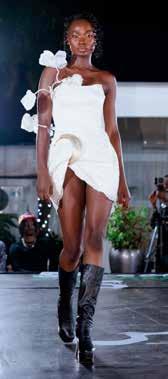








Recently, The Senior Lit Productions, an organization that specializes in curating and executing themed adult contemporary activations, held the Senior Lit 2024 event at the prestigious Lagos Polo Club. This event marked the 15th anniversary of Senior Lit, which is an annual marquee event strictly for adults.
The theme for this year’s event was “A Denim Affair,” and it was a night filled with style, reunion, memories, networking, great company, a variety of music, and lots of dancing. The event was well attended by captains of industries, diasporans, and Lagos socialites. Guests were treated to a delicious spread of gourmet food and signature cocktails, adding to the festive Detty December atmosphere of the evening. The highlight of the night was the sounds of old school music of the 70s, 80s and 90s, which had everyone on their feet and dancing the night away. As the event came to a close, attendees left with hearts full of joy and memories to last a lifetime, already looking forward to next year’s Senior Lit celebration








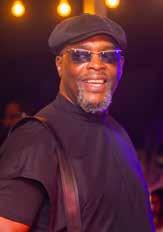


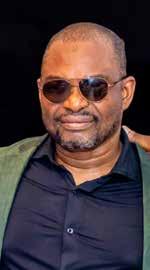







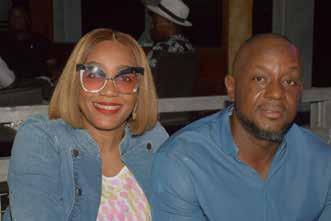







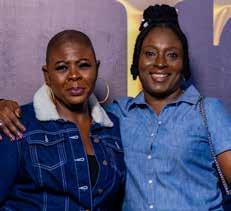



By Funke Babs-Kufeji


2025 is already off to a fast start! Many of you have set resolutions, and while some are sticking to them, others might be struggling. But here’s one resolution we think everyone should adopt this year: use your smartphones more mindfully. Our phones are such a big part of our daily lives, always within arm’s reach and constantly buzzing with notifications, messages, and updates. They keep us connected, but they can also trap us in a cycle of constant engagement, making us miss out on the beauty of the world around us. So, instead of getting lost in your phone, we encourage you to break away from those digital distractions and rediscover the richness of life outside the screen. Whether you want to boost your well-being, ignite your creativity, or just enjoy the moment, this guide is filled with activities that will help you appreciate the joys of the world around you.

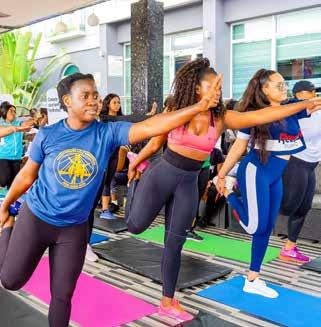


Have Meaningful Conversations
Set aside your phone and dive into some genuine, heartfelt conversations! Invite your friend and family round to a day or night of socializing and get genuinely talking. Open up about your feelings, really listen, and bond more deeply with them, free from the interruptions of notifications.
Pursue a Creative Hobby
There’s something deeply fulfilling about creating with your hands, engaging in a creative hobby such as painting, drawing, photography, or writing can be satisfying and fulfilling. It provides a chance to disconnect from your phone and spend time creating with your hands. Pursuing a creative hobby can bring joy and relaxation to your life. Kehinde Wiley
Engage in Outdoor Activities
Get out there and soak up some nature by trying out activities like play polo, biking, or hitting the water for some fun. Step away from your screens and breathe in that fresh air while taking in the beautiful views. It’s a great way to get your body moving and clear your mind with some exciting adventures. Taking a break from tech and diving into the outdoors can really help you escape the craziness of daily life. Whether you’re discovering a new path, kayaking down a river, or just enjoying the sunshine, being in nature can really lower your stress and boost your overall happiness. So, put on your hiking shoes or hop on your bike and get outside to recharge and reconnect with the world around you. Polo
Practice Mindfulness and Meditation
A In order to destress and rejuvenate from the stress of being connected to your smart phone, you can practice mindfulness and meditation by focusing on your breath or visualizing serene landscapes. Breathing techniques can also help calm your mind and reduce anxiety, while yoga and stretching can improve flexibility and promote relaxation.
Read a Book or Listen to Music
Disconnect by exploring new genres to discover fresh artistic expressions, whether it’s fantasy novels or different musical styles. You can also create a relaxing playlist to unwind and set a calming mood after a long day. For those who enjoy discussing books, joining a book club or discussion group is a great way to connect with others, share insights, and engage in lively debates, enhancing your reading experience and social interactions.
Exercise and Stay Active
To disconnect from your phone, you can engage in activities that focus on physical and social interaction, such as joining a fitness class or sports team. These activities keep you motivated and help you build connections with others while improving your physical health. Alternatively, taking a dance class or going for a run can lift your mood, boost your cardiovascular health, and allow you to enjoy some personal time without screen distractions.
By Funke Babs-Kufeji
A meticulously curated wardrobe must always include high-quality essentials that elevate those striking pieces in it. So, if you find yourself struggling to assemble outfits from your current capsule wardrobe, it may be due to the absence of some fundamental basics. One crucial item that may be missing from your collection, might be a pair of black leggings. These leggings serve as the quintessential foundation and a versatile base for any ensemble. While they may appear to be a simple necessity, it is vital to regard them with the same reverence as any luxury fashion item. To fully harness their potential, they should fit impeccably, offer unparalleled comfort, and be crafted from soft, stretchy fabrics that maintain their opacity. Often underestimated, black leggings are indispensable for completing your adaptable capsule wardrobe. Whether you opt for a sophisticated high-low ensemble or embrace a relaxed athleisure vibe, these essential styling tips are paramount for today’s fashion landscape
Monochrome Magic
Rock that all-black look like a boss - pair your black leggings with a black top for a sleek and sophisticated vibe that never goes out of style.
Effortless Elegance with a White Button-Up
Elevate your outfit by pairing your black leggings with a crisp white button-up shirt. It’s simple, chic, and perfect for a classy yet casual look.
Choosing the Perfect Footwear
Make a statement with your sneakers! Pair your black leggings with a bold and stylish pair of sneakers to add a touch of athleisure flair to your outfit.




By Konye Chelsea Nwabogor


It’s no secret that fashion loves a good dupe. Social media influencers tout them as budget-friendly alternatives, TikTokers show off their dupe hauls, and entire Pinterest boards are dedicated to tracking down “looks for less.” But while budget-conscious fashion lovers celebrate dupes and copies, the question remains: do they diminish the value of original designer brands? Or do they, ironically, add to the allure of luxury by keeping it just out of reach for the masses?
The recent frenzy around Walmart’s viral Wirkin Bag — an obvious nod to Hermès’ iconic Birkin — reignited this debate in the fashion community. For just under $100, shoppers could walk away with a bag that mimicked the silhouette of a Birkin, complete with a similar clasp and structure. It wasn’t pretending to be a Hermès bag (there was no counterfeit logo in sight), but the resemblance was unmistakable.
The Wirkin went viral for obvious reasons. The Birkin is a symbol of unattainable luxury, with waitlists spanning years and price tags soaring well into the six-figure range. Meanwhile, Walmart’s playful take was accessible to just about anyone. The moment TikTok users caught wind of it, the bag sold out within days, and its popularity prompted heated conversations online. Was it a fun and harmless nod to a luxury staple? Or did it disrespect the craftsmanship and exclusivity that Hermès is known for?
For decades, the fashion industry has grappled with this tension between exclusivity and imitation. Designers build their reputations on originality, artistry, and status. Yet, as quickly as a brand debuts a runway collection, knockoffs and dupes flood the market. Fast fashion brands are notorious for this — within weeks, they churn out pieces inspired by luxury collections, making high-end aesthetics available for a fraction of the price.
But what does this do to the value of the original? The argument against dupes is simple: they diminish the exclusivity and desirability of the authentic designer item. If everyone can carry a bag that looks like a Birkin, does owning a real one still hold the same weight?
Yet, some argue the opposite. “Dupes don’t ruin the original,” says Teni, a 27-year-old Nigerian fashion entrepreneur. They actually reinforce it.




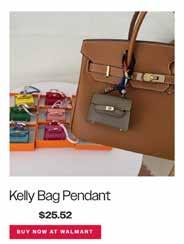
If everyone can carry a bag that looks like a Birkin, does owning a real one still hold the same weight?
People still want the real thing because they know it’s more than just the look. It’s about the history, the craftsmanship, and the story behind it.” Indeed, this sentiment reflects what luxury brands have always sold — not just products, but experiences and status symbols. Owning a Hermès Birkin isn’t about having a handbag; it’s about being part of an exclusive club that values heritage, rarity, and artisanal craftsmanship. A dupe might look similar from afar, but it lacks the intangible qualities that make the original so coveted.
But even as luxury brands rely on their legacy to maintain their exclusivity, they’re not immune to the influence of dupes. A viral moment, like the Wirkin Bag, can shift public perception. Suddenly, the conversation moves from “I’ll never own a Birkin” to “Maybe don’t need to.” And in an age where consumers value individuality and self-expression over rigid brand loyalty, this mindset shift can be dangerous for luxury houses.
The rise of dupes also raises ethical questions. While some see them as playful nods to high fashion, others view them as a form of intellectual property theft. Designers invest time, resources, and creative energy into producing original designs. To see those ideas copied and sold at a
fraction of the cost — often without any credit to the original creator — can be frustrating. However, not all brands see dupes as a threat. Some designers view them as a compliment, proof that their designs have reached cultural significance. In fact, the presence of dupes can sometimes amplify the desirability of the original item. The more people want the dupe, the more they aspire to own the real thing. Luxury marketing thrives on aspiration. The fact that so many people are clamouring for the Wirkin Bag doesn’t necessarily hurt Hermès. In fact, it reinforces the idea that the Birkin is the ultimate symbol of status. It’s the very inaccessibility of the real thing that makes it so desirable. The Wirkin may have gone viral, but it hasn’t taken anything away from Hermès’ power and prestige.
It’s also important to distinguish between dupes and counterfeits. Dupes don’t claim to be the real thing; they merely take inspiration from iconic designs. Counterfeits, however, are illegal copies that pretend to be genuine. The luxury industry has long fought against counterfeiting, investing millions in anti-counterfeit measures. But dupes occupy a legal grey area — they’re not illegal, but they still spark debate about originality and creative ownership. In the end, the impact of dupes depends on how consumers perceive them. For some, owning a well-made dupe is enough. They’re not interested in paying a premium for a designer label when they can achieve the same aesthetic for less. But for others, the real value lies in the authenticity, the story, and the heritage of the original.
The Wirkin Bag phenomenon shows that the fashion landscape is shifting. People want the look, but they also want to feel part of the story. And while luxury brands may scoff at the idea of a $100 Walmart bag being compared to a $20,000 Hermès Birkin, they can’t ignore the cultural significance of these viral moments. As fashion continues to evolve, so will the conversation around dupes and copies. But one thing is certain — the power of an original designer piece will always lie in intangible qualities that can’t be replicated: craftsmanship, heritage, and storytelling. And no $100 dupe can ever truly replicate that.
6
YOU NEED TO SET IN 2025
Say No without Hesitation
By Funke Babs-Kufeji
Family can be a great source of love and support, but sometimes they can also make you feel drained and guilty. Setting boundaries with your family is important for protecting your mental well-being and taking control of your life. To safeguard your peace and take back control, here are the boundaries you should establish.
Say no without hesitation; there is no need for excuses. The word “no” stands alone as a complete statement. When someone asks you to do something that you don’t want to do, it’s okay to say no. You don’t have to come up with a bunch of excuses or reasons why you can’t do it. Just say no and leave it at that. You have the right to set boundaries and say no when you need to
Stop being the family therapist
It’s totally normal to want to help out your family and friends when they’re going through a tough time. But remember, you’re not responsible for fixing everything. It’s okay to take a step back and let them figure things out on their own sometimes. Setting boundaries means knowing your limits and being able to say no when you need to. It’s important to take care of yourself first before trying to take care of others. So, don’t be afraid to tell someone, “I can’t assist you at the moment.”
Put an end to guilt trips
It’s important to remember that your choices are yours to make, and you shouldn’t let anyone make you feel guilty about them.
Make your mental health a top priority. It’s super important to take care of your mental health. Just like how you can’t pour from an empty cup, you can’t help others if you’re not feeling good yourself. Putting your mental well-being first is crucial because when you take care of yourself, everything else in your life will start to fall into place.
Protect Your Time Wisely
Your time is super important. Learn how to say no to things that aren’t helpful to you, and focus on what really matters in your life.
Take Care of Yourself First!
Focus on your own well-being. Looking after yourself is super imperative to living a good life. It’s not being selfish to prioritize your own needs over others. You won’t be able to help others if you don’t make sure to take care of yourself first.
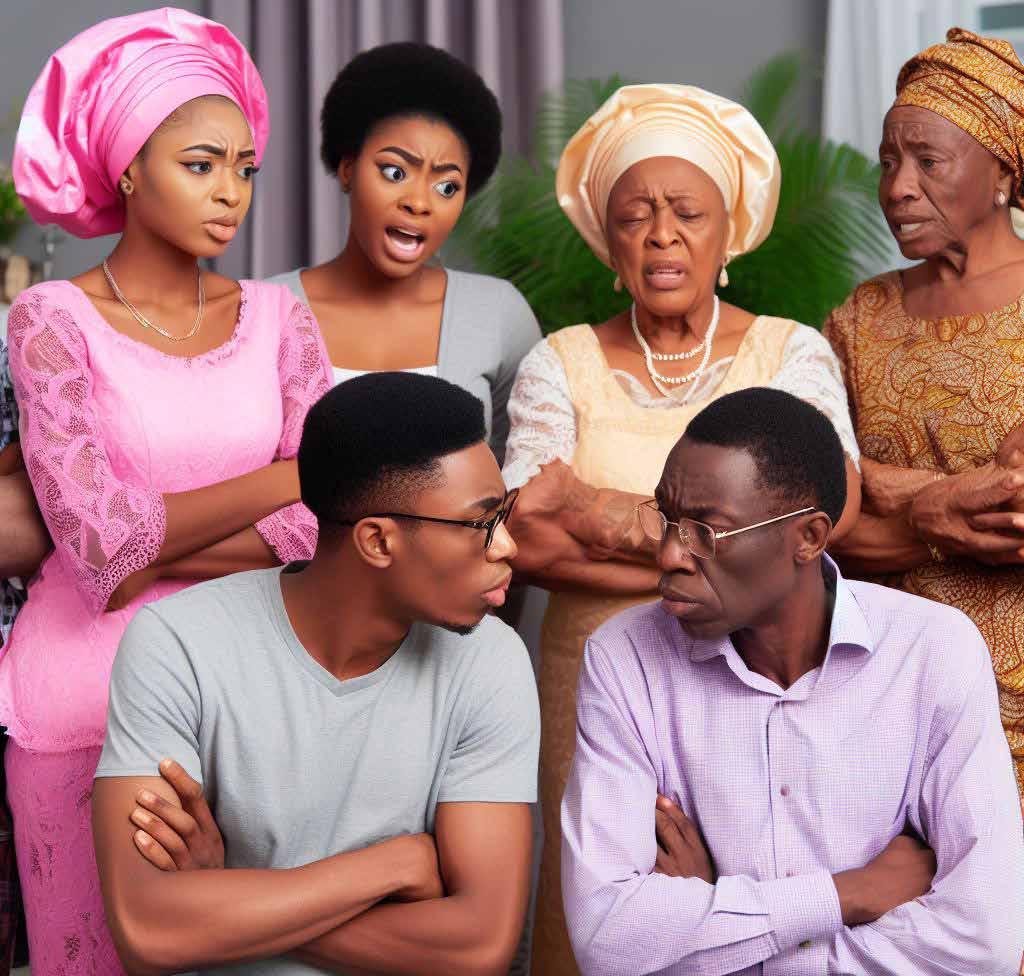

Dr. Adaeze Oreh is an accomplished public health expert and transformative leader, currently serving as the Honourable Commissioner for Health in Rivers State, Nigeria. With a distinguished career dedicated to advancing healthcare access and policy, she has consistently championed the needs of underserved communities, working to ensure equitable healthcare delivery across Nigeria.
Her expertise spans public health policy, healthcare reform, and community advocacy, underpinned by a robust educational background. She holds a Bachelor of Medicine and Surgery (MBBS) from the University of Nigeria, Nsukka, a Master of Science in International Health Management from Imperial College London, and a Master of Science in Public Health from the London School of Hygiene and Tropical Medicine. She is currently pursuing doctoral research at the University of Groningen, Netherlands. Her leadership trajectory includes her previous role as the Country Director of Planning, Research, and Statistics at the National Blood Service Commission, where she spearheaded pivotal projects to improve blood safety and availability in Nigeria. She played a key role in advocating for the passage of the National Blood Service Commission Act 2021 and the implementation of the Basic Healthcare Provision Fund (BHCPF), which expanded access to healthcare for vulnerable populations.
Dr. Oreh is a recognized global health leader, earning accolades such as the Aspen Institute’s New Voices Fellowship, the Amujae Leaders Initiative, and the Kofi Annan Fellowship for Global Health Leadership. She has also been awarded Best Poster Prizes at international conferences, further underscoring her expertise in the healthcare sector. Her scholarly contributions include co-authoring key publications on blood access and sickle cell disease in sub-Saharan Africa.
Beyond her professional accomplishments, Dr. Oreh is deeply committed to social impact and philanthropy. She serves on the advisory boards of several organizations focused on health and community development, including The Mansaray Foundation, the Centre for Family Health Initiative, and the White Ribbon Alliance for Safe Motherhood. She is also the founder and CEO of the Kaibeya Care Foundation Africa, through which she empowers vulnerable populations across the continent.
Dr. Oreh’s philosophy centers on honesty, fairness, empathy, innovation, and excellence, principles that guide her work to transform healthcare systems and improve lives. As a dynamic speaker and thought leader, she is frequently invited to address key issues in public health, women’s health, and global development.
Dr. Oreh’s enduring dedication to healthcare reform and her continuous efforts to empower underserved communities ensure that her legacy as a transformative leader in Nigerian healthcare is firmly established.
In this interview with Funke Babs-Kufeji, Dr. Oreh speaks abouther vision for the future of healthcare in Nigeria, the importance of leadership in the fight for equitable health, and how she balances her personal life with her trailblazing career.

Dr. Oreh, your career is deeply rooted in public health, leadership, and service to underserved communities. Can you take us on a journey through your career and share what motivated you to pursue this path?
During my early forays in the clinical wards as a medical student, was drawn to the medical specialty of cardiology. I was enchanted by how the heart works, and visualized myself as a pioneer who would work on developing innovative devices that addressed heart failure and congenital heart defects in newborns and young children. honestly believed that I had my future career all mapped out. However, by the time had spent more years of clinical training on the hospital wards, certain observations had begun to stand out which left me feeling uncomfortable. These were the differences I noticed in patients of different socioeconomic classes, educational levels, and those who lived in rural areas compared to those from the cities. That introduction to health inequities is the reason why deviated from cardiology to pursue a career in public health primarily to help close gaps in access to quality healthcare for underserved communities.
As someone who has held significant positions both in Nigeria and internationally, how have your educational experiences in the UK and Netherlands shaped your approach to healthcare reform in Nigeria?
My experiences over the years and exposure to global health systems have engendered a bold, transformational approach to healthcare reform which is community-oriented but steeped in collaborative decision-making. As an advocate for the empowerment of underserved communities, this means actively seeking out community voices from populations that are often not projected, to ensure that their perspectives weigh in on our policymaking.
You’ve been a driving force behind the passage of the National Blood Service Commission Act 2021. What does this achievement mean for Nigeria’s healthcare system, and how will it impact blood service accessibility in the country?
The journey to the passage of the National Blood Service Commission Act 2021 on the 29th of July 2021 was a tumultuous, decadelong expedition, and clear testament to the importance of grit, persistence, and committed collaboration. Oftentimes, people are amazed that a country like Nigeria that has provided varying degrees of blood services as part of patient care, had no law protecting patients from exploitative practices that can endanger public health. This legislative framework has enormous implications for ensuring that blood services are more sustainably funded, and services can be strengthened nationwide. Meaning that blood for transfusion can be safely screened, protecting patients from inadvertently being infected with HIV, hepatitis B, hepatitis C and syphilis; and hard-to-reach communities can have access to safe blood necessary to save the lives of women and children, who form the majority of transfusion recipients in our environment.
the wider population in Nigeria; thus, taking us closer to our goals for universal health coverage and improved health and wellbeing.
You’ve also secured billions of Naira in funding for healthcare services, which has positively impacted millions of Nigerians. What strategies did you employ to secure such funding, and how do you ensure that these funds are effectively allocated to the communities?
Bearing in mind that these funds are earmarked for transformational health initiatives, the goal is ‘more lives saved for every kobo spent.’ By communicating the potential impact of investing resources on health, demonstrating judicious use of funds, and clearly displaying the outcomes and impact, this encourages trust, and attracts more funding opportunities.
As the Commissioner for Health in Rivers State, you are shaping healthcare policies at the state level. What are your top three priorities for the state’s healthcare system, and how do you plan to achieve them?
One of my contributions in championing women’s health was my involvement in the Gender in Health Technical Working Group of the Federal Ministry of Health and Social Welfare. This TWG was focused on addressing these barriers which women face when accessing healthcare and sharing recommendations with facilities and communities nationwide on how best to tackle them
Our top 3 priorities in Governor Fubara’s #Health4AllRivers agenda for healthcare in Rivers State are improving financial and geographic access to healthcare across the state, addressing gaps in the health workforce and health data/information, and enhancing domestic resource mobilization all under an umbrella of improved healthcare leadership and governance. We seek to achieve these goals through prioritizing healthcare delivery in the retinue of responsibilities of the state, attracting respectful and result-oriented partnerships, and utilizing strategies that attract and retain a skilled workforce that is the life-force behind any robust and resilient health system. One of the main tasks of State Commissioners for Health is to convince the Chief Executive of the importance of healthcare. That has never been my challenge with Governor Siminalayi Fubara, as right from the getgo, he has been a champion of accessible community-oriented healthcare, even from the earliest moments when he communicated this to the people of Rivers State during his inaugural address.
sharing recommendations with facilities and communities nationwide on how best to tackle them.
You’re also a member of the White Ribbon Alliance for Safe Motherhood. How do you see the intersection of women’s health and overall public health reform in Nigeria? What initiatives are you working on to improve maternal health outcomes?
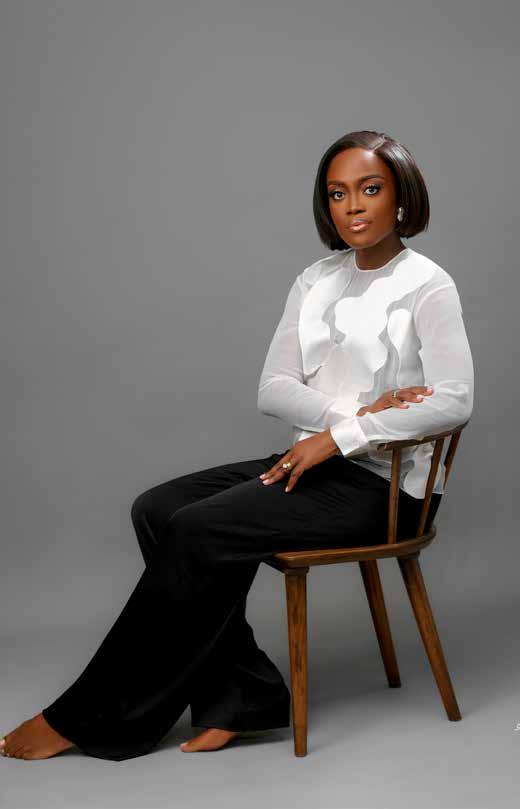
One of the immense benefits of engaging on global health platforms has been the heightened awareness of the role that indigenous, people-led approaches can have in transforming developmental challenges. It has therefore strengthened my resolve to engage deeply and respectfully with community systems to address healthcare issues and bring about positive change.
The implementation of the Basic Healthcare Provision Fund (BHCPF) has been a milestone in improving healthcare access. Can you walk us through how you played a role in this initiative and the challenges you faced in ensuring its success?
In 2016, decided to become more intentional about lending my advocacy voice to broader health issues beyond blood safety in Nigeria. Around this time, there was considerable public interest in the full implementation of the National Health Act 2014. To do this, I started actively writing opinion editorials calling for health systems reform and universal health coverage (UHC), and these were published nationally. I teamed up with advocacy groups such as Nigeria Health Watch, lending my advocacy voice to citizen dialogues, public hearings, and meetings with parliamentarians actively pushing for Nigeria to take a clear stance towards UHC. Unsurprisingly, because of the significant financial commitment required, our advocacy met with clear resistance and push-back. However, the strength of our collective citizen voices and the international interest in engendered meant that those calls could not be silenced. This led to the actualization of the Basic Healthcare Provision Fund (BHCPF) which has transformed the delivery of primary healthcare and financial coverage for vulnerable and
Your leadership philosophy emphasizes honesty, fairness, empathy, innovation, and excellence. How do you balance these values with the realities of public service, especially in a field as complex as healthcare? joined the federal public sector in 2009, coordinating blood services for three Northern States (FCT, Niger, and Nasarawa), and so, for the past 16 years I have navigated the public sector. At the time of my entry, I was appointed to lead a project borne out of a bilateral partnership between the Federal Government of Nigeria and the US government, and the work was largely development-partner driven. That imbibed a very keen sense of performance, teamwork, innovation, and excellence in my approach to public service. Additionally, some of my core values include honesty, fairness, and empathy; and so, this has substantially aided me in navigating community engagement. Despite the complexity of healthcare, people are at its heart; and respond positively when in today’s world where often words can be thrown carelessly without thought or careful consideration, they trust that you say what you mean, and you mean what you say. Also, being able to relate to people’s life experiences and valuing the input and perspectives of communities in my policy development and implementation has also served me enormously over time.
As a champion for women’s health, what are the key barriers that women in Nigeria face when accessing healthcare, and what steps do you think need to be taken to address them?
Some of these barriers include limited access to finances, information, and even respectful care at some health facilities. Deliberate efforts to educate and financially empower women can greatly reduce the obstacles they can face when accessing healthcare. One of my contributions in championing women’s health was my involvement in the Gender in Health Technical Working Group of the Federal Ministry of Health and Social Welfare. This TWG was focused on addressing these barriers which women face when accessing healthcare and
Nigeria is currently placed as one of countries with the highest maternal mortality rates globally. This largely informed the national health reform driven by the Honourable Coordinating Minister for Health & Social Welfare, Prof. Muhammad Ali Pate. As members of the Nigeria Health Commissioners Forum, we worked with the Coordinating Minister and his team to co-design, co-create and co-implement a reform that cuts across the three levels of healthcare – primary, secondary, and tertiary to drastically address poor maternal health outcomes and improve survival rates in even the most remote communities. This aligns with our focus in Rivers State, and was delighted to be present at the national launch of the Maternal Mortality Reduction Innovation Initiative (MAMII) in Abuja in November 2024, and our teams are keen to drive its implementation in our state. Maternal death is a pressing global health issue today, with countries like Nigeria contributing upwards of a quarter of those deaths. Therefore, reforms hinged on leveraging existing health system structures to curb maternal deaths are more likely to lead to sustainable improvements in maternal survival rates. Thus, putting an appreciable dent on the number of women who die each year from pregnancy and childbirth.
There is enormous potential for women in leadership within the health sector. However, gaps remain. Even though women constitute a majority of the health workforce, their presence in leadership at the higher levels remains sub-optimal.
What role do you see for women in leadership within the healthcare sector, especially given your own inspiring journey? How can young women aspiring to enter healthcare leadership follow in your footsteps?
There is enormous potential for women in leadership within the health sector. However, gaps remain. Even though women constitute a majority of the health workforce, their presence in leadership at the higher levels remains sub-optimal. For example, less than 2% of the Health Commissioners are female, and looking at the headship of health institutions in Nigeria, these gender gaps are evident. For young women aspiring to healthcare leadership, I would say that very often, opportunities show up as problems to be solved. Take them on, and realise that you will either succeed, or you will learn. No one started out their career or leadership as an expert. You may never get another chance to prove yourself.
You have had the opportunity to engage with global health platforms such as the Aspen Institute and the Kofi Annan Fellowship for Global Health Leadership. How have these experiences shaped your perspective on the challenges and opportunities in healthcare on the global stage?
Beyond your professional roles, your philanthropic efforts and involvement with various health-related organizations are truly remarkable. Can you share how these initiatives complement your official duties and the impact they have on vulnerable populations?
I grew up observing my parents actively engage in philanthropic efforts, and so this created a sense of awareness of one’s innate ability to reach out to the less privileged around us. In 2017, my work as a Family Medicine physician in community hospitals motivated my establishment of Kaibeya Care Foundation Africa focusing on community health and welfare. The foundation relies on collaborations with Programme-implementing foundations to carry out activities and complement my official duties by enabling me reach out to vulnerable populations in ways that may be beyond the mandate of my official role.
Several of our most impactful projects have included funding cancer care for children, medical outreaches in internally displaced persons (IDP) camps, repairs and equipping of community primary and secondary schools in Northern Nigeria, and most recently, our children and widows outreach at Ndoni, Rivers State, and awarding scholarships in Medicine & Surgery to deserving female scholars.
As someone who has worked tirelessly to bring about policy change, what advice would you give to young professionals looking to make a difference in public health and leadership roles? My advice would be that as a young professional, never allow opportunities to meet you unprepared. Actively seek out opportunities for self-improvement and professional development, and always be open to learning new things, new ways, and new approaches, so that innovation becomes a part of you. Also, be committed to delivering excellent work, despite the challenges which you will undoubtedly face, and regardless of how ‘lowly’ the task may seem.
You’ve achieved so much in your career already, but what drives you to keep pushing for progress in healthcare every day?
Every day, am reminded that my career goes way beyond me as a person but is an opportunity to reach out and inclusively improve the lives and wellbeing of people in our communities. It is a sense of responsibility that have carried in every office that have been privileged to occupy and is my motivation to push for better every single day. ‘Better’ to me means more lives saved, and more individuals and families that have improved health, wellbeing and quality of life.
Last night, Los Angeles shimmered under the spotlight of Hollywood’s brightest stars as the 82nd Annual Golden Globes took center stage. The Beverly Hilton buzzed with excitement as the biggest names in film and television gathered to celebrate a year of outstanding storytelling. But let’s be honest — before the awards were handed out, the real show took place on the red carpet. The Golden Globes have always been synonymous with daring fashion choices. This is where stars take risks, play with textures, and set the tone for the year ahead. And in 2025, the red carpet was no exception. It was a parade of elegance, avant-garde silhouettes, and nostalgic nods to Hollywood’s golden age. From timeless glamour to futuristic flair, the stars didn’t disappoint. Here are our favorite looks from the night — the ones that made us gasp, swoon, and screenshot immediately.







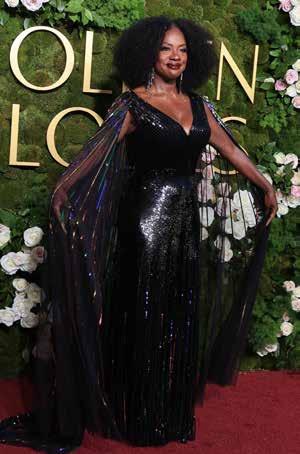








In the current fashion scene, being modest doesn’t mean you have to give up on looking stylish. There’s a rising trend that embraces a variety of fashion choices, making it super easy to dress in a way that reflects your values while still being trendy. Whether it’s due to religious beliefs, cultural backgrounds, or just personal preference, modest fashion has transformed into a symbol of grace, innovation, and empowerment.
Gone are the days when modesty meant dull, frumpy clothing. Nowadays, you can choose modest attire without losing your sense of style, as many popular designers are now featuring modest options in their fashion lines. With a touch of creativity and some helpful style tips, you can confidently express modesty while remaining stylish and trendy embrace modesty while keeping it fashionable of trends.
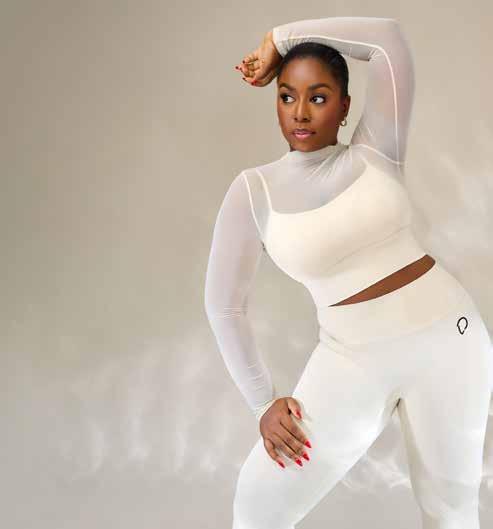
Go for Modest Activewear
Athleisure has really opened up a fresh category of clothing that’s both modest and trendy. Nowadays, sportswear brands are rolling out activewear that offers great coverage while still being super functional. Think high-waisted leggings, long-sleeve workout tops, and stylish tunics as some of the cool options you can find. Grab some high-waisted leggings and throw on a long, oversized tunic or hoodie. It’s a breeze to switch from the gym to a laid-back hangout by teaming these pieces with some trendy sneakers or slip-on shoes.

Layering
If you want to dress modestly but still look chic, layering is the way to go. Instead of opting for outfits that show too much skin, layering lets you cover up while keeping your style on point. Consider teaming a longsleeve top with a sleeveless dress or throwing on a tailored jacket over a simple dress. This not only elevates your look but also adds versatility to your closet. Remember, layering doesn’t mean you have to wear bulky or baggy clothes. Choose fitted, lightweight layers in neutral shades or colors that complement each other to keep your outfit looking sleek

MAKE YOUR DECEMBER SALARY WORK FOR YOU TILL THE END OF JANUARY

Classic silhouettes strike the perfect balance between modesty and elegance. Aline dresses, high-waisted trousers, and midi skirts are not only fashionable but also versatile enough to be worn modestly. These styles offer ample coverage while flattering various body shapes. Go for iconic pieces like the “little black dress” you can easily style it modestly with some clever layering or accessories. For a classy and refined vibe, try teaming a midi dress with a long cardigan or a classic trench coat— this combo never goes out of style. Model for Mot The label
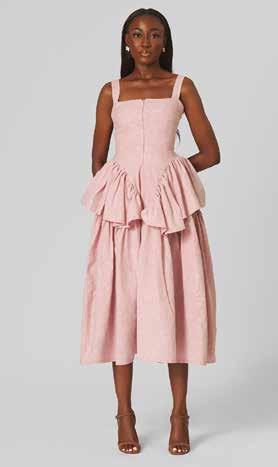

Embrace the Power of Maxi Dresses and Skirts
Maxi dresses and skirts have become must-haves for those wanting to nail a chic and modest look. They provide ample coverage while still looking stylish. You can find them in all sorts of styles, from laid-back bohemian vibes to sleek, tailored designs. Don’t be afraid to mix it up with various prints, textures, and shapes. Floral designs, stripes, and polka dots are just as trendy as solid colors, and pleated or A-line maxi skirts can really enhance your outfit. For a modern yet modest feel, consider teaming a maxi skirt with a tucked-in blouse.
After the holiday fun of Detty December, a lot of people struggle to stretch their paycheck until the end of January. Shifting from the “detty December” spending spree to a more budget-friendly mindset can be tough, but with some smart strategies and the right attitude, you can definitely find financial balance.

Evaluate Your Current Financial Situation.
Take a good look at your finances after all that holiday shopping. Be honest about how much money you have left and where you stand financially so you can make wise budgeting decisions. Put together a budget that reflects your income, essential expenses, and any debts you still owe. Setting clear spending limits will help you tackle the month with more confidence in your finances.
Budget Appropriately.
Keep your eye on the must-pay bills like rent, utilities, and loan payments to cover your basic needs. By tackling these important expenses first, before splurging on extras, you’ll build a financial safety net that keeps you steady. Consider cutting back on non-essential spending, like dining out or shopping. Look for free or low-cost entertainment to help you save more and make your budget go further.
Embrace DIY and cost-effective travel
Cooking at home can really help you save a lot on food costs compared to eating out. If you plan your meals,
shop smart for groceries, and find joy in cooking, you can whip up delicious homemade meals without breaking the bank.
Taking public transport or carpooling is another awesome way to reduce your commuting expenses, like petrol, parking, and car maintenance. Check out some budget-friendly transport options to lower your monthly travel costs.
Cut down on those impulse buys
The holiday season comes with many splurges on things you don’t need. To keep your spending in check, going forward plan to steer clear of unexpected costs. Write up a shopping list before you head out (or shop online) and make sure to follow it. Concentrate on what you actually need instead of getting caught up in all the deals. If you feel the urge to buy something on a whim, take a 24-hour break to think it over. This little trick can help you figure out if you really need that item or if it’s just a passing fancy.
Leverage Discounts and Deals to Stretch Your Income
Further
Saving a penny is like adding to your dream vacation stash. Before you buy anything, take a moment to check for sales and discounts. And hey, loyalty really does have its perks! Explore loyalty programs and cashback deals like you’re on a treasure hunt for financial goodies. Whether you’re racking up points from your grocery runs or snagging cashback on online buys, these programs can really help you make the most of your money. So, get signed up, flash that loyalty card, and enjoy watching your savings pile up while you treat yourself without the guilt.
If you know me, or you’re my friend, acquaintance, or colleague in the media and entertainment industry (and, by extension, any industry), then you’ve probably heard my go-to greeting: “Working boy!” It’s my playful way of acknowledging hustle and hard work—a term borrowed from popular slang among the “yutes”, often used to describe those making money through less-thanlegal means. Of course, my use of the phrase couldn’t be further from that connotation. For me, it’s a salute to those genuinely grinding, showing up, and doing the work. Some laugh it off; others might tell me, “Don’t call me that.” But when you strip it down, being a working boy is just that—being someone who does the work. Enter Emmanuel Goodnews. In a city where fashion is not just an industry but a way of life, Emmanuel has carved a space for himself as one of the most promising young stylists on the rise. From styling the stars of Real Housewives of Lagos to crafting wedding day magic for Moses and Marie Bliss, his work reflects passion, persistence, and an unwavering commitment to his craft. Not forgetting a regular clientele that includes household names like Hilda Baci, Osad Ighodalo, and Enioluwa Adeoluwa, Emmanuel’s journey is a masterclass in hard work meeting opportunity. Yet, for all the glitz and glam that comes with styling celebrities, he remains refreshingly grounded, a testament to his belief in the transformative power of fashion and his respect for the hustle. And while he’s just getting started, it’s safe to say the fashion world better make room—this working boy is here to stay.
Interview by Ayo Lawal
Emmanuel, you’ve built an impressive portfolio at such a young age. What sparked your passion for fashion styling, and when did you know this was your path? And let’s get real—did you ever doubt your journey? How did you push through?
Growing up, I was always fascinated by the transformative power of fashion. think what sparked my passion was watching my mom get ready for special occasions. She’d try on different outfits, and I’d see how each look changed her confidence and demeanour. From there, I started experimenting with styling my friends and family, and it just clicked.
As for self-doubt, I’d be lying if said I never questioned my path. There have been times when I felt like wasn’t good enough or that was in over my head. But I’ve learned to push through those feelings by focusing on my why and reminding myself how far I’ve come.
Fashion in this city can feel like a battlefield. What were some of the toughest challenges you faced breaking into the industry, and how did you overcome them?
Breaking into the fashion industry in this city can be tough, especially when starting from scratch. One of my biggest challenges was building my network and getting my foot in the door. overcame it by being persistent, attending industry events, and reaching out to people admired in the field. I also ensured that I was always prepared and had a strong portfolio showcasing my skills.
Every stylist has that breakthrough moment. For you, what was the first job or client that made you think, ‘Yes, I’ve arrived’?
There have been a few turning points in my career, but two jobs that stand out were styling Priscilla’s Bridgerton-inspired look in 2023 and Enioluwa’s AMVCA look in the same year. Both experiences were surreal, and they made me feel like I was making a name for myself in the industry.
You’ve worked with some of the biggest household names, who ap-

proach their brands in different ways. How do you keep your creative edge while adapting to a wide variety of personalities and aesthetics?
Maintaining my creative edge is all about staying curious and inspired. I make it a point to attend fashion shows, read industry publications, and follow other stylists and designers on social media. When it comes to meeting the demands of diverse personalities, think it’s all about being a good listener and being able to adapt to different aesthetics and visions.
Mentorship is often key in the fashion world. Did you have anyone guiding you when you started, or did you figure it all out solo?
To be honest, I didn’t have a mentor when I started out. It’s been a journey of figuring things out on my own, but I’ve always been inspired by my friend Style Territory (may God bless her soul). She was a talented stylist who always pushed me to be my best self.
What’s a lesson the fashion industry taught you that no book, school, or mentor ever could?
One lesson the fashion industry has taught me is that relationships are everything. It’s not just about having a great eye or being able to put together a beautiful outfit – it’s about building trust with your clients, being reliable, and delivering exceptional service.
Styling a wedding is no joke, especially one as high-profile as Moses and Marie Bliss’s. What was the most memorable moment for you from that experience, and what did it teach you?
Styling Moses and Marie Bliss’s wedding was an unforgettable experience. The most memorable moment for me was seeing the love and connection between the couple as I styled them. It was a truly special experience, and I feel grateful to have been a part of it.
The road to success can be isolating. With so much achieved already, how do you stay motivated, especially on those days when it feels like too much?

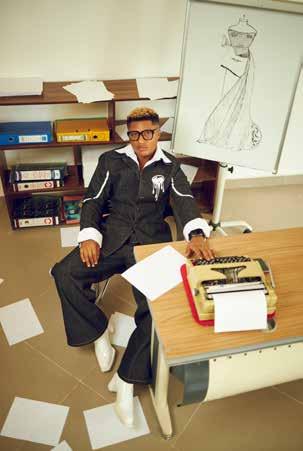

Staying motivated can be tough, especially on days when the pressure feels overwhelming. For me, it’s all about taking a step back, focusing on my why, and reminding myself of how far I’ve come. I also make it a point to celebrate my small wins and take care of myself physically and mentally.
There’s this glamorous image of fashion stylists, but what’s a common misconception people have about your work that you wish they understood better?
One misconception about being a fashion stylist is that it’s all glamour and fun. While those things are definitely part of the job, it’s also a lot of hard work, long hours, and attention to detail. People often don’t see the behind-the-scenes work that goes into creating a beautiful outfit or looks.
Fashion is a way of life, but let’s talk personal style—what’s your go-to look when you’re off the clock? Or is dressing down not even in your vocabulary?
When I’m off-duty, love to keep things simple and understated. You can usually find me in distressed denim jeans, a plain white or black T-shirt, and sleek sneakers. I’m all about comfort and practicality when I’m not working.
One misconception about being a fashion stylist is that it’s all glamour and fun. While those things are definitely part of the job, it’s also a lot of hard work, long hours, and attention to detail.
Balancing artistry with the business side of styling can’t be easy. How do you manage to stay true to your creative vision while navigating the realities of running a brand?
Balancing the artistic side of styling with the demands of running a successful brand can be challenging, but for me, it’s all about finding that sweet spot where creativity meets commerce. make it a point to stay focused on my unique vision and aesthetic while also being open to new ideas and perspectives.
Your story is so inspiring to up-and-coming stylists. What’s the one piece of advice you’d give to someone who dreams of following in your footsteps?
My advice to young stylists is to stay true to themselves and their unique vision. Don’t be afraid to take risks and try new things—it’s often the biggest risks that lead to the greatest rewards. Also, never underestimate the power of hard work, dedication, and attention to detail.
When you think about the future, what legacy do you want to leave in the fashion industry?
When I think about my legacy in fashion, hope that people will remember me as a stylist who was true to himself and his art. hope that my work will continue to inspire and influence future generations of stylists and designers.
If we raided your styling kit or wardrobe right now, what’s that one item you’d fight to protect? Something with a story, perhaps?
If you raided my styling kit, the one item I’d guard with my life is a bag gifted to me by a friend. It’s a one-of-a-kind, handmade staple that holds a lot of sentimental value.
Fashion is fueled by creativity, but inspiration often strikes from the most unexpected places. What’s been your wildest or most surprising source of inspiration so far? find inspiration in the most unexpected places—from the colors and textures of nature to the architecture and design of the city. But honestly, some of my wildest and most unexpected sources of inspiration have come from my dreams. I’ve had instances where I’ve woken up with a clear vision of a look or a concept, and it’s been amazing to see those ideas come to life.
